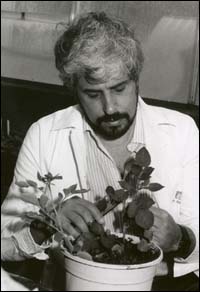
A potato richer in amino acids essential to the body has been genetically engineered by Dr. Gad Galili, Ms. Orit Shaul and Dr. Avihai Perl of the Department of Plant Genetics.
A major nutritional drawback of many crop plants -- including grains, potatoes and legumes -- is their low content of lysine and several other crucial amino acids. The level of these important organic compounds remains low mainly because the plant automatically curtails their production as soon as they begin to accumulate. Using potato and tobacco plants as experimental models, Dr. Galili has found a way to overcome this problem.
The accumulation of amino acids in plants inhibits the activity of dihydrodipicolinate synthase (DHPS), one of the enzymes that synthesize lysine. Looking for a more resistant enzyme, Dr. Galili and associates turned to the DHPS in E. Coli bacteria, which is far less sensitive to lysine build-up. He extracted DNA segments coding for the bacterial DHPS, engineered them to enable their expression in plants, and introduced them into potato and tobacco cells. In both of these species, lysine levels manufactured by the genetically engineered enzyme proved to be significantly higher than those produced by the natural variety. Tobacco plants exhibited up to a 15-fold increase in free lysine, while in potato plants it increased four-fold in the leaves, five-fold in the roots and three-fold in the tubers.
Human proteins contain about 20 different kinds of amino acids, the basic building blocks of all protein. However ten of these -- the "essential" amino acids -- cannot be synthesized by the body and must be provided ready-made via the diet. Malnutrition, especially among children, is prevalent in many poor parts of the world where the standard diet contains insufficient quantities of these vital compounds, and cultivable potatoes richer in essential amino acids would help alleviate this situation.
Dr. Galili's current research is also aimed at improving the incorporation of lysine into seed proteins of cereals, thereby elevating lysine levels even further in these important crop plants; such an advance would greatly enhance the prospects for the development of more nutritious varieties of cereals.
